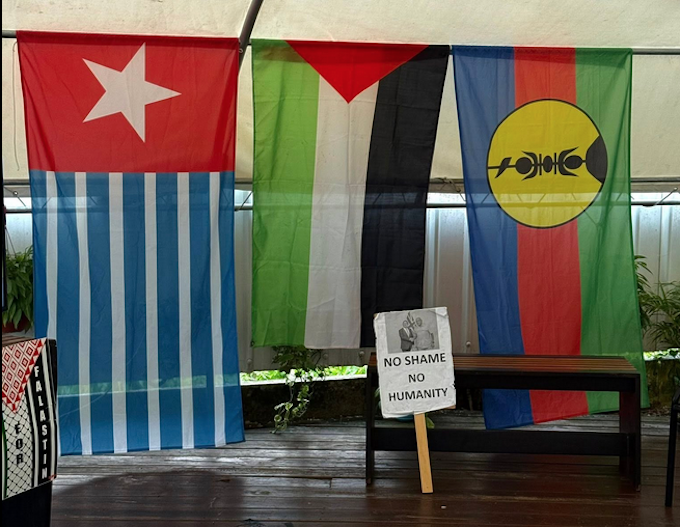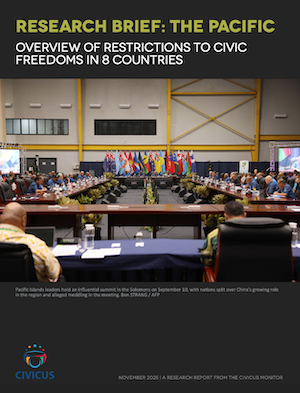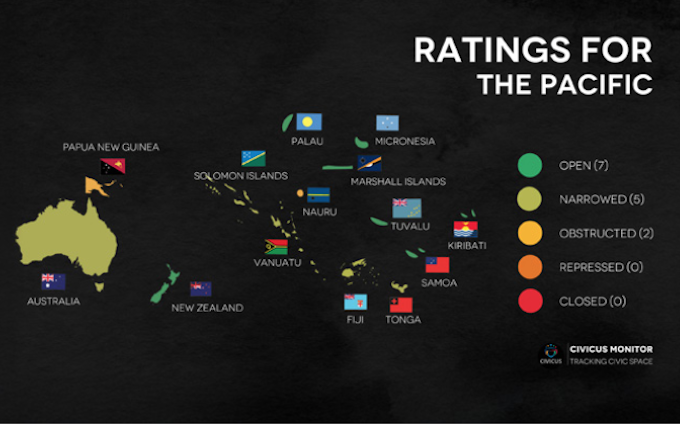
Asia Pacific Report
The global civil society alliance Civicus has called on eight Pacific governments to do more to respect civic freedoms and strengthen institutions to protect these rights.
It is especially concerned over the threats to press freedom, the use of laws to criminalise online expression, and failure to establish national human rights institutions or ratify the International Covenant on Civil and Political Rights (ICCPR).
But it also says that the Pacific status is generally positive.

Nauru, Papua New Guinea, Samoa and Solomon Islands have been singled out for criticism over press freedom concerns, but the brief published by the Civicus Monitor also examines the civic spce in Fiji, Kiribati, Tonga and Vanuatu.
“There have been incidents of harassment, intimidation and dismissal of journalists in retaliation for their work,” the report said.
“Cases of censorship have also been reported, along with denial of access, exclusion of journalists from government events and refusal of visas to foreign journalists.”
The Civicus report focuses on respect for and limitations to the freedoms of association, expression and peaceful assembly, which are fundamental to the exercise of civic rights.
Freedoms guaranteed
“These freedoms are guaranteed in the national constitutions of all eight countries as well as in the ICCPR.
“In several countries — including Fiji, Kiribati, Nauru, PNG and Samoa — the absence of freedom of information laws makes it extremely difficult for journalists and the public to access official information,” the report said.
Countries such as Samoa, Tonga and Vanuatu, continued to enforce criminal defamation laws, creating a “chilling environment for the media, human rights defenders and anyone seeking to express themselves or criticise governments”.
In recent years, Fiji, PNG and Samoa had also used cybercrime laws to criminalise online expression.
“Governments in the Pacific must do more to protect press freedom and ensure that journalists can work freely and without fear of retribution for expressing critical opinions or covering topics the government may find sensitive,” said Josef Benedict, Civicus Asia Pacific researcher.
“They must also pass freedom of information legislation and remove criminal defamation provisions in law so that they are not used to criminalise expression both off and online.”
Civicus is concerned that at least four countries – Kiribati, Nauru, Solomon Islands and Tonga – have yet to ratify the ICCPR, which imposes obligations on states to respect and protect civic freedoms.
Lacking human rights bodies
Also, four countries — Kiribati, Nauru, Solomon Islands and Vanuatu — lack national human rights institutions (NHRI).
Fiji was criticised over restricting the right to peaceful assembly over protests about genocide and human rights violations in Palestine and West Papua.
In May 2024, “a truckload of police officers, including two patrol cars, turned up at a protest at the premises of the Fiji Women’s Crisis Centre against human rights violations in Gaza and West Papua, in an apparent effort to intimidate protesters”.
Gatherings and vigils had been organised regularly each Thursday.
In PNG and Tonga, the Office of the Ombudsman plays monitor and responds to human rights issues, but calls remain for establishing an independent body in line with the Paris Principles, which set international standards for national human rights institutions.
“It is time all Pacific countries ratify the International Covenant on Civil and Political Rights (ICCPR) and ensure its laws are consistent with it,” said Benedict.
“Governments must also to establish national human rights institutions to ensure effective monitoring and reporting on human rights issues. This will also allow for better accountability for violations of civic freedoms.”












































